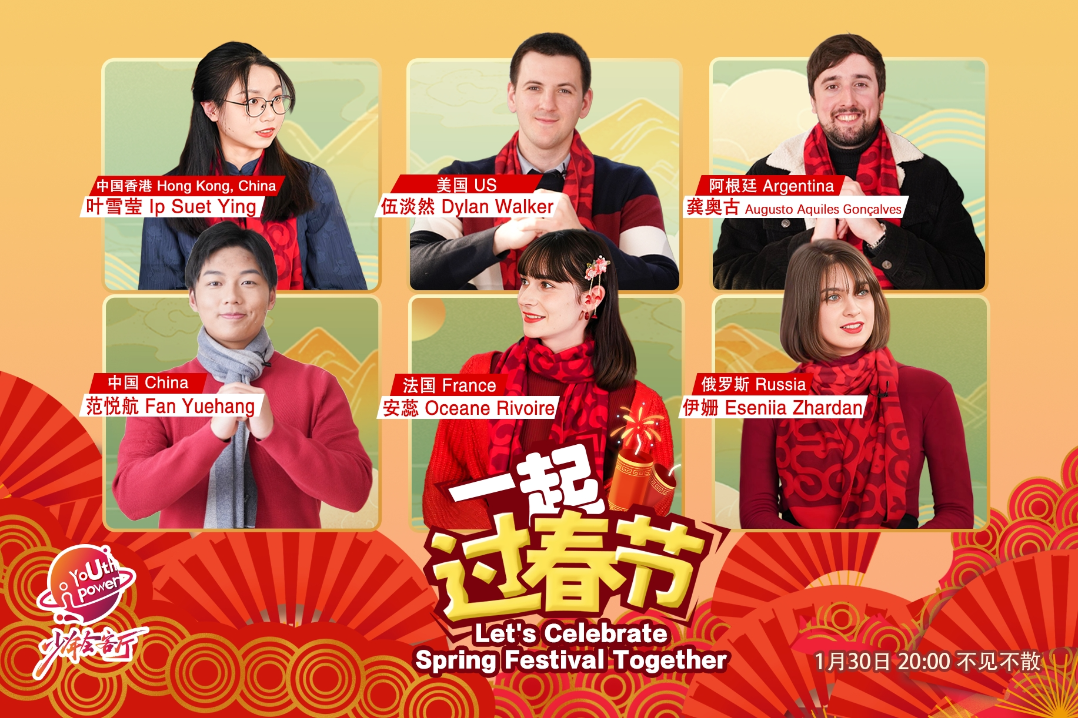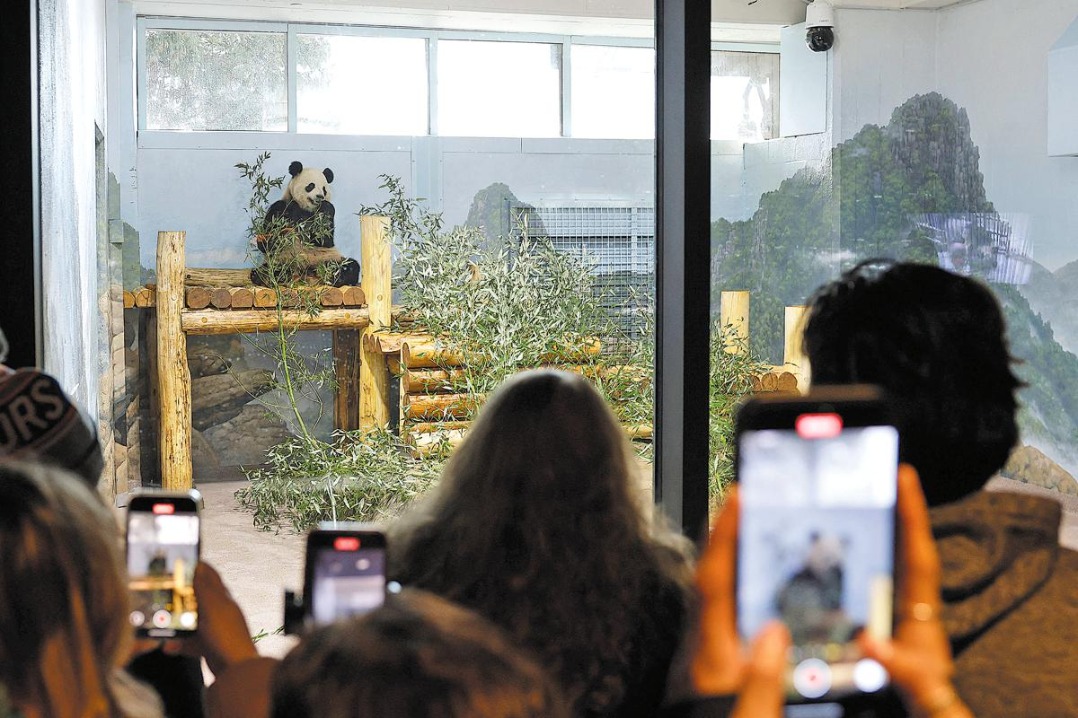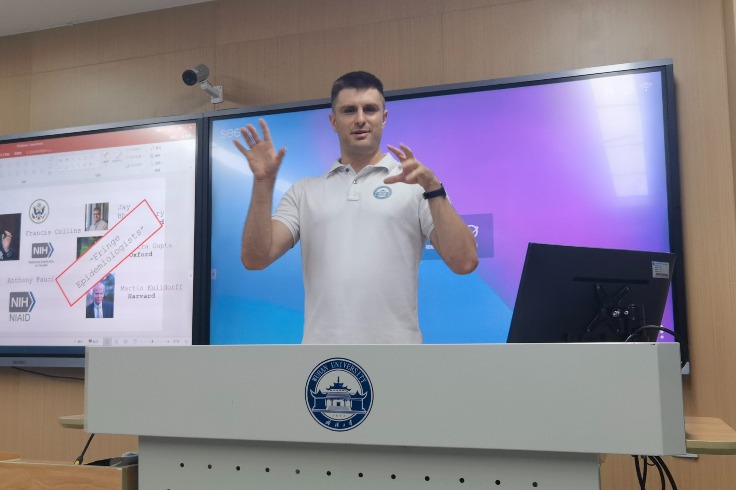Understanding society
Peking University's sociology department is carrying on with a spirit of inquiry after four decades of development, Fang Aiqing reports.

As Peking University's sociology department has come through 40 years of exploration and development since its reestablishment in 1982, the faculty, alumni and students are tracing its history and academic tradition with a spirit of inquiry. "Find something you want to look into and then stick it out until you penetrate it to reach the truth," says Zhou Feizhou, head of the department, citing the first dean Yuan Fang (1918-2000) to describe the tradition.
This year also marks the centennial anniversary of the establishment of the department's predecessor, the sociology department of Yenching University, in 1922.
Over the century, it has grown in observing society with sociological approaches, especially on the country's rural problems and ethnic groups' life situations, led by a wealth of big names including Wu Wenzao (1901-85), Fei Xiaotong (1910-2005) and Lei Jieqiong (1905-2011). These scholars pioneered Chinese sociological studies and laid its foundation in China despite war, political turmoil and scarce research resources.
From the late 1890s, Chinese scholar Yan Fu (1854-1921) translated British sociological classics, including Thomas Henry Huxley's Evolution and Ethics, Herbert Spencer's The Study of Sociology and John Stuart Mill's On Liberty, into Chinese. Yan put the word sociology as qunxue, meaning the study of a group of people, indicating the discipline is to understand the laws underlying the relationship between individuals and society that's made up of individuals.
In 1916, Yan's student Kang Baozhong (1884-1919), then teaching the history of the Chinese legal system at Peking University, started the first sociology course at the university, marking the beginning of sociology education in the country.
Yenching University was one of the most renowned Christian schools in China led by John Leighton Stuart (1876-1962), who later became US ambassador to China, from 1946 to 1949. The university kept close ties with Western academic circles, which resulted in Chinese scholars being informed on the most updated academic ideas in the West.
For example, in the 1930s, Wu, then head of the department, invited US sociologist Robert E. Park and social anthropologist A.R. Radcliffe-Brown to visit and lecture.
And since its founding, the sociology department of Yenching set off a wave of social investigations. They conducted surveys or interviews to learn about rickshaw pullers or the living standards of grassroots workers and teachers in Beijing as early as in the 1920s. These investigations were not limited to the urban economy but also involved villages and agricultural topics.
Worth noting is also a series of community research on the villages of Qinghe town, today part of suburban Beijing. Some of them integrated social reform experiments like countryside loans and women and children's welfare improvement.
In July 1939, the teachers took students to the town's Pingjiao village, with around 60 households, to visit villagers and observe and collect research material. Some students moved to live with the villagers for research, learning sociology from real life while expanding knowledge about Chinese social structures that have their roots in the countryside.
Their comprehensive, diverse research covered topics like village industry, cottage crafts, political structure, education, religious beliefs, and also women's living conditions, and were largely based on human ecology and traditions of structural functionalism represented by the academic contribution of Park and Radcliffe-Brown.
From material life, social institutions and organizations to culture and history, they provided a multidimensional understanding of villages and formed what Wu called an overall study. He expected to draw some general conclusions for the whole country based on detailed case studies, according to Zhou.
It was in such an academic environment that the most well-known Chinese sociologists, including Fei, Lin Yaohua (1910-2000), author of The Golden Wing: A Sociological Study of Chinese Familism, and C.K.Yang (1911-99), a former professor at the University of Pittsburgh in the United States and head of the sociology department at the Chinese University of Hong Kong, gained their initial training.
During the War of Resistance Against Japanese Aggression (1931-45), Yenching's sociologists managed to continue research and teaching in Southwest China's Yunnan province.
"I felt that a more crucial problem to be solved after the war is how we are going to build our country. It's my responsibility to prepare for it with my knowledge and what I should do is to form a scientific understanding about Chinese society," Fei wrote in the preface of Earthbound China, a field report of three villages in Yunnan looking at agriculture, handicraft industries and commerce that he researched during the war.
At that time he had received his doctorate degree from the London School of Economics and Political Science where he learned from Polish-British anthropologist Bronislaw Malinowski and made an arduous journey to return to his motherland. Fei's doctoral dissertation, published in English under the name Peasant Life in China and which made him known in the West, described consumption, production, distribution and trading in Kaixiangong village on the lower reaches of the Yangtze River, and how the economic system, geographical environment and social fabric of the community interplayed.
It was based on notes of his lectures given at the National Southwestern Associated University and Yunnan University in Kunming also during wartime that formed two of his most influential and renowned works, From the Soil: The Foundations of Chinese Society and Shengyu Zhidu (institutional system of reproduction). From the Soil summarizes and gives explanations of fundamental characteristics of Chinese society, its traditional culture and social structure, and how it differs from the West.
Major insights of this book include what Fei named chaxugeju (a differential mode of association), in which Chinese people are born into social relations resembling a series of concentric circles that are produced by one's own social influence. As each circle, with the self as its center, spreads out, the social relations become more distant and insignificant. This mode provides a powerful interpretation for Chinese guanxi (networking) traditions.
In 1952, Yenching was closed and part of it was merged with Peking University. Meanwhile, all sociology departments in Chinese universities were closed and sociologists repositioned, mainly turning to ethnological studies and socioeconomic investigations in rural China.
It was in 1979 that restoring sociology departments in Chinese universities were put on the agenda and Fei was a key figure in resuming research and teaching after being suspended, first by training potential teachers and young scholars. He and a group of peer scholars invited sociologists from home and abroad to lecture on Chinese sociology traditions and updated sociology theories and methods in the West while compiling corresponding textbooks.
The sociology department of Peking University was officially reestablished on April 9, 1982, with 13 teachers and six postgraduate students. It began to recruit undergraduates the following year.
Zhou himself was enrolled in the department in 1986. His college life was filled with frequent field studies, from township and village enterprises in Kunshan, Jiangsu province, to urban neighborhood economy in Shenyang, in northeastern Liaoning province.
They usually spent several months visiting locals during the day and at night sharing their findings among teachers and classmates. By comparing their observations with that of their teachers, the students accumulated the academic experiences essential to extend or deepen their thinking and cultivate a sociological imagination.
Extensive field research and an individualized way of teaching has been highlighted through the past four decades, according to Zhou, who's now passing on the tradition to younger generations. He recalls bringing the students to interview female migrant workers, often separated from their children, but working to earn a better living for their families.
"The students were touched and they wouldn't criticize the mothers for leaving their children behind in the countryside or for not giving enough care and company. On the contrary, it proves that a strong family tie maintains China's stability with a huge migrant population. It's a typical Chinese phenomenon," Zhou says about field study that has helped sociology-majored students to see the real world and change the way they think.
He adds that this idea stemmed from an insight that Fei, who kept doing field research almost until he was 90, came up with in the 1990s.
It's natural that the sociology students at Peking University attach great importance to China's rural problems, says Xiao Shijian, who was among the first undergraduates of the department.
Born and brought up in the urban environment of Beijing, a two-month stay in rural Yunnan during the first year of college and the three months spent in Wuxi, Jiangsu province, in the last year influenced her career choice. In 2017, she quit the job as CEO of Greater China for Klipsch Group, a US audio equipment manufacturer and founded a rural primary school in Zheng'an county, Southwest China's Guizhou province, living there and exploring a local education mode that's rooted in the soil and suitable for rural children.
She says she is applying sociological and anthropological theories and methods in her educational exploration, and the training in college has taught her to always respect people and their culture.
Scriptwriter Mei Feng, who entered the department in 2000, describes his writing practice as doing field research in real life, and that the education has helped him to grasp subtle changes in society and "eliminate his writing from being superficial".
According to Zhou, the department now has 13 teaching and field research bases around the country, and the spirit, as Fei put it, "of learning from practice (field study), to touch the temperament of society "is shared among the faculty and the students.



Today's Top News
- Xi sends Chinese New Year card in return to friends in US state of Iowa
- Xi congratulates Lukashenko on his reelection as Belarusian president
- Xi lauds China's solid progress despite challenges in Year of Dragon
- High-level Sino-US talks continue
- 30 years on, WTO continues to drive growth
- Renewal, rebirth must mark Year of the Snake





























